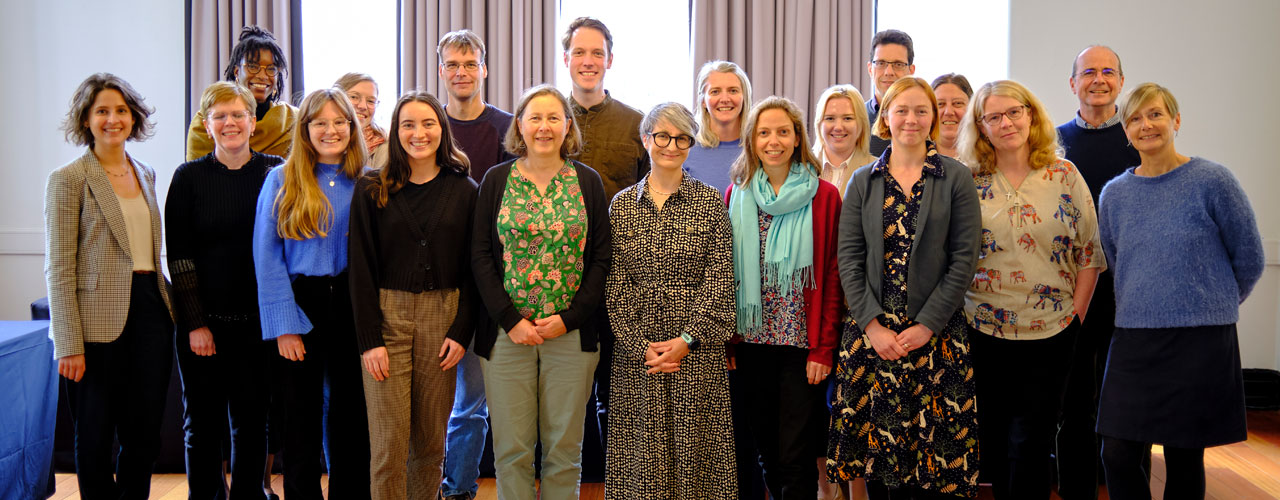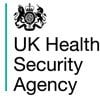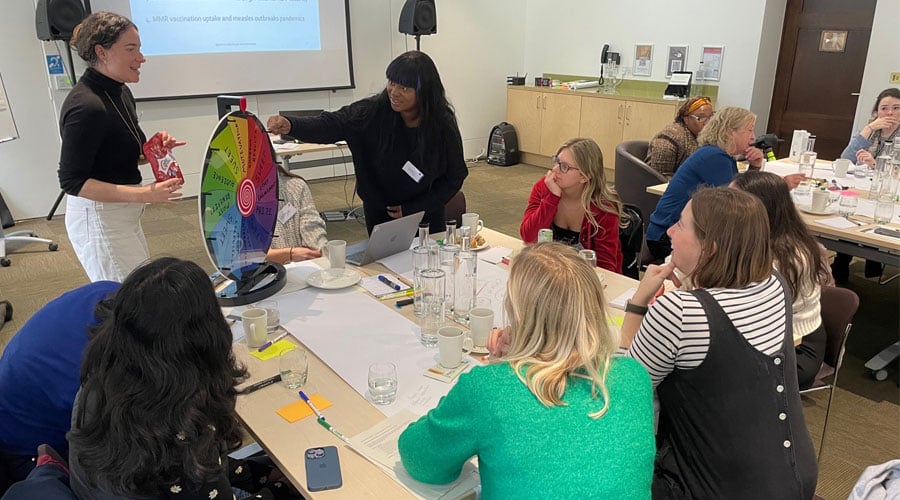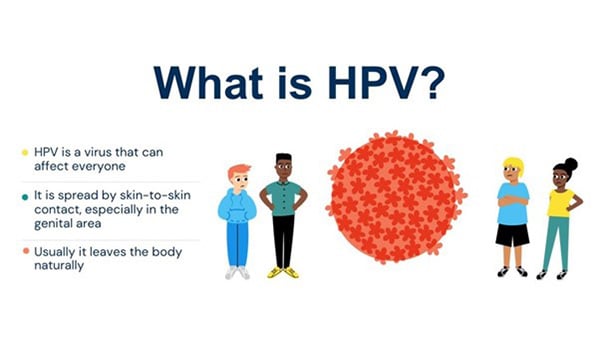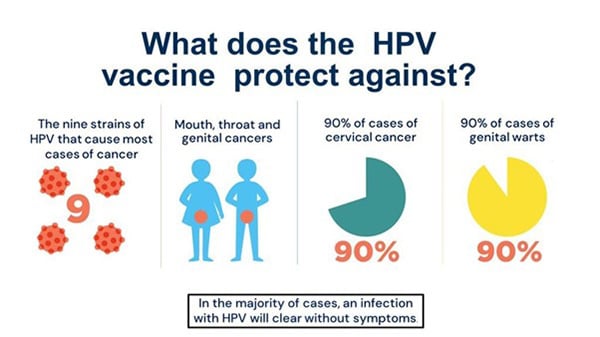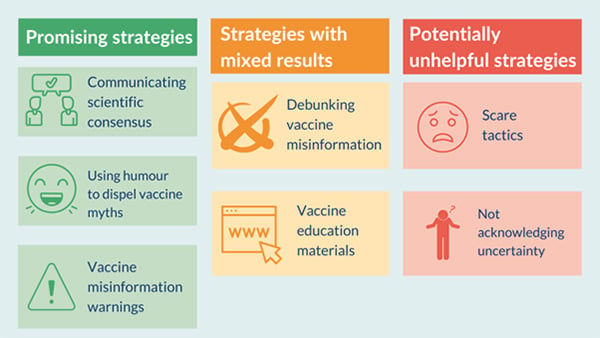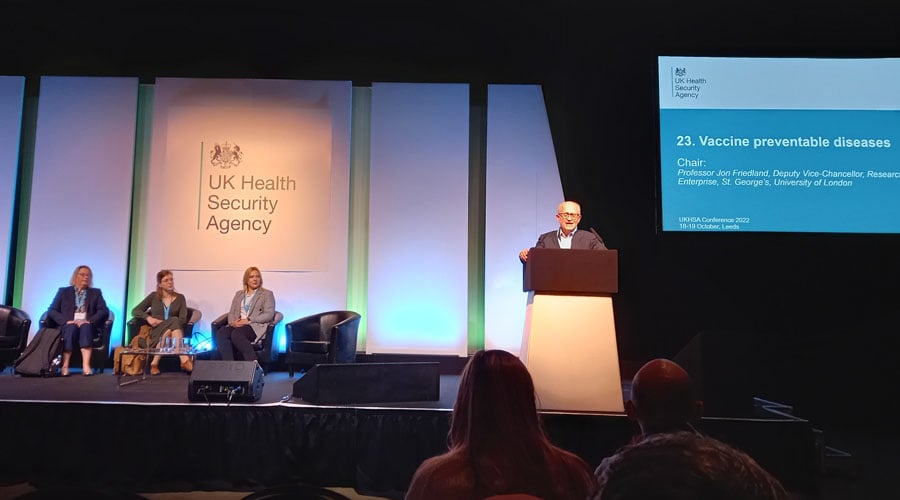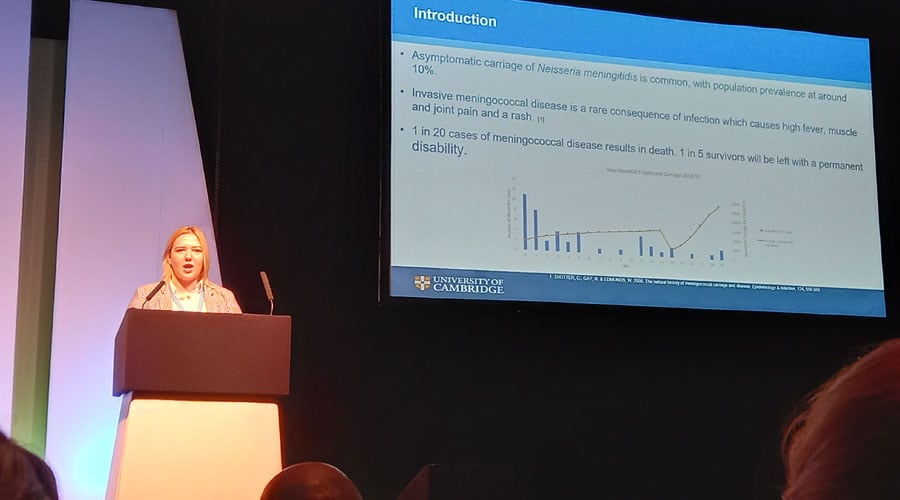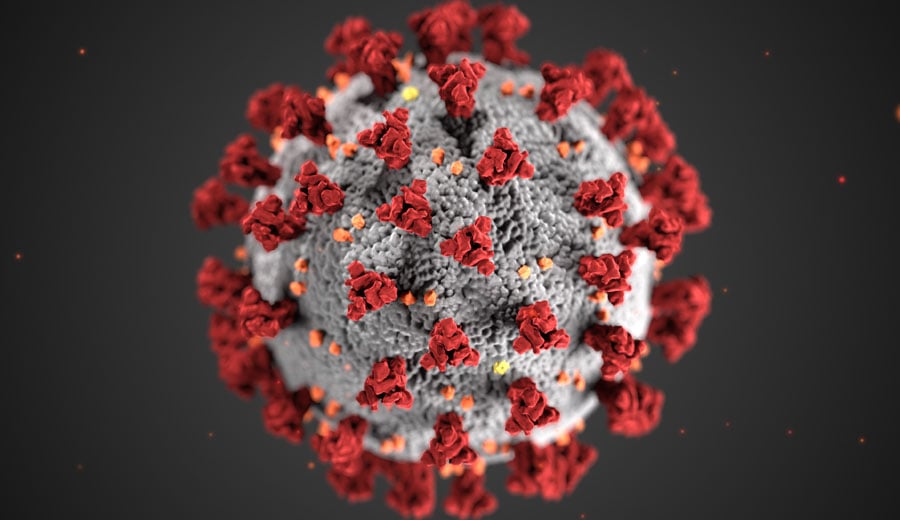The NIHR Health Protection Research Unit is a partnership of scientists from the London School of Hygiene & Tropical Medicine, UKHSA and Cambridge University. Our research aims to reverse the decline in immunisation coverage in children, increase vaccine uptake in adults and reduce inequalities in the vaccine service.
For more information check out this short video about our work!
The HPRU in Vaccines and Immunisation looks at the effectiveness and safety of vaccines, how many people are being vaccinated, disease trends, and the impact of introducing new vaccines. We also look at what people think about vaccines and how we can make it easier for people to access vaccinations.
Partnership
The NIHR Health Protection Research Unit in Vaccines and Immunisation is a partnership between the UK Health Security Agency (UKHSA) and the London School of Hygiene and Tropical Medicine, in collaboration with the University of Cambridge.
HPRUs
Our unit is one of 14 Health Protection Research Units (HPRUs) across England, part of an investment by the National Institute for Health Research (NIHR) to protect the health of the nation. The HPRUs fund high quality research that enhances the ability of UKHSA to use innovative techniques to protect the public’s health and minimise the health impact of emergencies, such as COVID-19.
Each NIHR HPRU undertakes high quality research that is used by UKHSA to keep the public safe from current and emerging public health threats.
The NIHR HPRUs focus on collaboration and knowledge sharing, and play a pivotal role in maintaining and growing UKHSA’s scientific expertise and future workforce. The multidisciplinary centres of excellence also deliver responsive research to tackle emerging or potential public health emergencies.
NIHR
The NIHR's mission is to improve the health and wealth of the nation through research. The NIHR was established in 2006 and is primarily funded by the Department of Health and Social Care.
Working in partnership with the NHS, universities, local government, other research funders, patients and the public, the NIHR delivers and enables world-class research that transforms people’s lives, promotes economic growth and advances science.

Mary Ramsay
Director, Head of Immunisation, UKHSA
Nick Andrews
Sophie Graham
Doctoral Researcher, LSHTM
Liz Miller
Professor
Julia Stowe
Researcher, UKHSA

Jemma Walker
Senior Statistician, UKHSA; Assistant Professor of Statistical Epidemiology, LSHTM

Lauren Adams
Doctoral Researcher, University of Cambridge
Andre Charlett
Head of Statistics, Modelling and Economics Department, UKHSA

Andromachi Karachaliou
Research Assistant, University of Cambridge
Edwin van Leeuwen
Senior Mathematical Modeller, UKHSA

Caroline Trotter
Principal Research Associate, University of Cambridge
Vanessa Saliba
Immunisation, Hepatitis & Blood Safety Department, UKHSA
Gayatri Amirthalingam
Knowledge Mobilisation Lead, UKHSA
Lee White
- Theme 1 - Making the most of real-world data
-
This theme aims to increase vaccine coverage and support a data-driven immunisation programme by making the most of digital technologies and linked electronic health records.
Objectives:
- Drive evidence-based immunisation policy
- Improve vaccine coverage and reduce health inequalities
- Make the best use of data in the immunisation programme
To support an evidence-based response to COVID-19, we have undertaken studies to identify who is at risk of COVID-19, understand the effect of the pandemic on uptake of routine childhood vaccinations such as measles, and will be studying the safety and effectiveness of COVID-19 vaccination.
An over-arching focus over the five years is understanding how to reduce health inequalities in vaccine uptake and vaccine-preventable disease, including an HPRU-funded PhD to focus on how mental health affects vaccine uptake among mothers and babies.
We will continue to develop methods for better use of data in delivery and evaluation of the immunisation programme, and vaccine-related research. This will include an HPRU-funded PhD to develop understanding of ‘healthy vaccinee bias’ (in which people who receive vaccines tend to differ from those who do not) and methods to address this in vaccine research.
Many of our studies make use of anonymised information from NHS patient health records, which is provided by patients and collected by the NHS as part of their care and support, and we are very grateful to the patients and NHS workers who make this possible.
Find out more information on the value of patient data for research.
- Theme 2 - Saving lives, optimising taxpayers' investment
-
UK Health Security Agency (UKHSA) uses models of vaccine-preventable diseases to inform (i) the Joint Committee on Vaccines and Immunisation decisions about new vaccine introductions and alterations to the existing schedule; (ii) vaccine procurement; and (iii) making the public health and economic case for investment in robust vaccine programmes.
The methodology for economic models is mature, thanks largely to innovative research over the last 20 years arising from a collaborative partnership between staff now at LSHTM and UKHSA. However, vaccine questions grow increasingly complex and need solutions that are transparent and acceptable to both policymakers and the public.
Objectives:
- Ensuring that new vaccines save lives and optimise taxpayers' investment
- Making existing vaccines more efficient
- Reducing antimicrobial resistance through vaccination
To ensure vaccines provide value for money we will:
- Develop mathematical and economic models for new vaccines
- Examine whether vaccines can also prevent the development of resistant superbugs
- Theme 3 - Immunisation delivery systems and public interactions with vaccines
-
This theme will examine how immunisation systems work, and evaluate public responses to vaccination programmes. It aims to understand why targeted populations do not always seek vaccination and implementers do not always create opportunities for vaccinating them. Evidence gathered will support UKHSA to improve uptake, reduce inequalities and increase programme efficiency.
Objectives:
- Evaluate vaccine delivery models to increase uptake
- Understand modern social trends on vaccine uptake and vaccine confidence. We aim to complement attitudinal tracking by UKHSA, provide in-depth insight into under-vaccinate
- Provide evidence to strengthen immunisation systems
- Exploit new technologies to increase uptake and efficiency
To sustain trust in vaccines we will:
- Help the NHS modernise the childhood vaccine schedule in a way that is acceptable to parents
- Explore and respond to public concerns about vaccines through population surveys and automated analyses of online social media
- Provide an in depth understanding of attitudes towards and barriers to vaccination of communities with lower uptake
- Support evidence-based communication about vaccines
At the HPRU in Immunisation we have developed and refined our PPIE aims as of March 2021:
- Our aim for public involvement is to improve the quality and relevance of research in vaccines and immunisation by the HPRU.
- Our aim for public engagement is to raise awareness of our research at the HPRU and to share knowledge of research about vaccines.
Our PPIE activities include:
- Presenting at ‘Pint of Science’ evenings, at ‘Science Museum Lates’, at science days in schools, Cheltenham Science Festival, Wellcome Packed lunch, and podcasts
- Representation from our public panel at the annual advisory board meeting
- Requesting and receiving feedback on research documents, such as study information sheets and questionnaires
- Speaking with parents and adults about their reasons for vaccine hesitancy
Read our PPIE strategy.
Recent PPIE events
- 18 March 2024: Public Engagement Workshop: Shaping the future of England’s vaccination programme
- 19 October 2023: Online workshop to make our studies more relevant for and acceptable to people affected by shingles, immune system problems, or mental health conditions
- 29 March 2023: Choices in research – How can you be involved?
- 30 November 2022: Science Lates: Injecting Hope @ Science Museum
- 3 October 2022: Help shape research in vaccines and immunisation
- 28 February 2022: Nigerian parent engagement Workshop
- 20 January 2022: Webinar: Covid-19 vaccination during pregnancy?
Outputs
- Experiences of vaccinating children during the first phase of the coronavirus (COVID-19) pandemic in England and parents and guardians’ perceptions towards COVID-19 vaccination (pdf)
- Co-design of a study with parents in partnership with a community (November 2022 – February 2023) (pdf)
If you would like to know more or if you have any questions, please contact our PPIE co-coordinators, Pauline Paterson & Sadie Bell.
The ethos of our HPRU is to promote learning and facilitate the career progression of all who contribute to our research programme, which includes PhD award holders, HPRU staff and other trainees. Our main goals for the duration of our grant are to:
- strengthen the capacity of our dynamic multi-disciplinary team to ensure that we are equipped to address current and future public health and immunisation research priorities,
- engage proactively with the NIHR research infrastructure to nurture mutually beneficial research collaboration and learning partnerships with other HPRUs, ARCs and BRCs, and
- consolidate our contribution to the training of Public Health and General Practice registrars and students engaged in post-graduate public health related courses.
To achieve these goals, we will build on our existing internal HPRU and broader institutional teaching and learning capacity and seek to access additional training support through the NIHR Academy and the broader NIHR research infrastructure.
Academic Career Development in NIHR Infrastructure and NIHR Schools
Strategy
Group 1: PhD degree award holders
This group consists of PhD students, whose degree is funded by the HPRU and who have a training plan with a defined end date.
Ambitions
- Provide world class doctoral training for the next cohort of public health research leaders
Group 2: HPRU Staff
This group consists of early-mid career researchers, senior investigators, and project management staff. All staff can access internal training programmes and are encouraged to complete training in teaching and doctoral supervision.
Ambitions
- Enhance the expertise of our existing multi-disciplinary research and project management team by signposting them to NIHR and other funding, fellowship and training opportunities suited to their stage on the academic/research or project management career pathway.
- Give early-mid career researchers increased responsibility for designing, implementing and managing studies guided by theme leads
Group 3: Other trainees
This group consists of Public Health (PH), General Practice (GP) registrar trainees and LSHTM MSc students. We aim to facilitate placements and short-term research projects for these trainees. We also extend invitations to our public engagement events, such as our Annual Science Day, to all trainees within our network, so that they are provided with opportunities for gaining familiarity with HPRU research, networking, and presenting research project findings.
Ambitions
- Facilitate short-term placements (defined contributions to research projects and co-authorship on manuscripts) for Public Health and General Practice trainees through: i) existing collaborations with UKHSA and NHS England immunisation teams and, ii) making connections with public health registrar training co-ordinators in London, Kent, Surrey and Sussex
- A public-health consultant member of the HPRU (Helen McDonald) will train as a Faculty of Public Health supervisor for public health registrars.
- Accommodate short-term dissertation related research opportunities (approx. 6-10 weeks) for LSHTM MSc students via the LSHTM Vaccine Centre and its Student liaison committee.
Objectives
We have generic and group specific objectives. Our generic objectives focus on ensuring that information about training and career development opportunities are shared widely, strengthening and establishing research, and training collaborations across the NIHR infrastructure. Core objectives for PhD award holders are to ensure that they receive the support and guidance they need to complete their theses and plan their next career moves. Key to this will be encouraging them towards opportunities afforded through their NIHR Academy membership. The essence of the objectives for HPRU Staff is to signpost all staff to career stage appropriate training and development opportunities and identify those who would benefit from NIHR Academy membership to help them apply for fellowships or similar awards. The objectives for other trainees focus on ensuring that our HPRU is an outward facing resource which supports the development of non-HPRU public health researchers though training and research placements.
Pathways to Impact
- Regularly updated career development resources. HPRU team members contributing to NIHR facilitated research networks and involved in collaborative training and research activities.
- Completion of 6 PhDs resulting in new researchers moving into roles that will make a difference to public health and starting their journeys to become future research leaders.
- HPRU staff benefitting from general NIHR and NIHR Academy specific training and funding opportunities
- Facilitation of PH & GP registrar trainee placements
- Opportunities for MSc students to conduct immunisation related projects.
Collaboration
We are keen to strengthen existing and establish new research and training collaborations with HPRUs, ARCs and BRCs across the NIHR infrastructure. We also want to increase our support and engagement with Public Health and General Practice Training programmes.
Training Opportunities
- Public Involvement Training
- UCL Hospitals Patient & Public Involvement Training Courses
- LSHTM Public Engagement
Contact
The Academic Career Development Lead for the HPRU in Immunisation are Tracey Chantler. Please get in touch with her for more information.
The HPRU held a public engagement workshop at Friends House on 18 March 2024 with members of the public and healthcare professionals. The days' activities included interactive sessions where we discussed our research projects and gathered suggestions on how we can better involve and engage with the public throughout our research in a meaningful way. Six healthcare professionals 11 members of the public , and some members of the HPRU participated in the workshop.
The workshop began with a presentation from Louise Letley (UKHSA) which outlined the current UK immunisation schedule. This was followed by two interactive, round table sessions where attendees shared their input on the topics of “What are your priorities for vaccine research?” and “How can we best involve you in our research”? We are keen to consider learnings from these sessions as we develop our research plans and develop new outputs.
Many thanks to our thoughtful contributors!
What was this study about?
People under 65 in clinical risk groups are at risk of severe illness, hospitalisation and death from influenza, yet seasonal influenza vaccine coverage rates in this cohort are profoundly low. We explored the reasons for non-vaccination among 3 different clinical risk groups. We also interviewed healthcare providers and commissioners to understand the acceptability and feasibility of integrating vaccine programme delivery in non-primary care settings.
What did we find out?
The study found that people in clinical risk groups were often unsure about the relevance of influenza vaccines for their long-term conditions, or did not feel themselves to be at risk of severe illness from influenza. Healthcare providers rarely discussed or recommended influenza vaccines, despite being well placed to offer condition-specific information. Healthcare providers were positive about integrating vaccine programme delivery in non-primary care settings, but questions remain about feasibility due to resources and training.
View the research summary (pdf).
On Tuesday 5th December, we hosted a showcase at LSHTM and online for our NIHR-funded PhD students to share some of their research findings and methodologies with members of the public and the LSHTM community. It was an exciting event, hosted by HPRU Director Anthony Scott, with engaging presentations and thoughtful questions.
Presentations included:
- Understanding the association between maternal mental health and vaccine uptake and timeliness in early childhood – Anne Suffel, LSHTM
- Exploring childhood immunisation among Nigerian migrant families in South London: A critical look at 'vaccine hesitancy' – Oyinkansola Ojo-Aromokudu, LSHTM
- Advancing methods to account for biases in observational vaccine effectiveness research – Sophie Graham, LSHTM
- Socioeconomically disadvantaged parents' experiences of accessing childhood vaccination services in England from birth to age 1: emerging findings from a qualitative longitudinal cohort study – Georgia Chisnall, LSHTM
Watch one of our student's presentations below:
- Should England introduce a universal chicken pox vaccine? Modelling and health economic results - Lauren Adams, University of Cambridge
We are very proud of our PhD students – for all of their achievements to date and to come!
Many thanks to those who attended.
Three years have passed since the first doses of COVID-19 vaccines were administered in the UK. Multiple booster campaigns have been conducted each year, with varying eligibility based on age and clinical vulnerability.
To help summarise overall progress of the vaccine roll-out, HPRU researchers have collaborated with the University of Oxford to develop a new vaccine coverage ‘snapshot’. This looks at how many doses of COVID-19 vaccine people in England have typically received, how long ago they were last vaccinated, and how these measures differ by age, ethnicity, socioeconomic status, and in different clinical risk groups.
The report highlights the considerable progress of the vaccine roll-out. For example, prior to the autumn 2023 booster campaign, people over the age of 75 had typically received six doses, and 88% had been vaccinated in the last year. However, the report also highlights significant differences in vaccine uptake according to ethnicity and socioeconomic status, as well as gaps in vaccine coverage in several vulnerable clinical subgroups. Continued efforts to address these immunisation gaps are needed as a new round of autumn boosting commences.
HPV is a common infection that is spread by skin-to-skin contact, including sexual contact, which can lead to the development of cancers affecting both women and men, including the cervix, vulva, vagina, penis, anus, and oral cavity.
In England, young people aged 12 to 13 years are offered immunisation against HPV as part of the NHS vaccination programme. Research has shown that in England cervical cancer has almost been eliminated among young women who were offered the HPV vaccine. The programme has also been shown to be good value for money for the NHS.
Our research has identified sustained inequalities in uptake by area and minority ethnic groups. Further, we identified unmet information needs among young people in schools where vaccination uptake is low, with implications for obtaining consent and vaccination uptake.
Addressing young people’s information needs
To address information needs among young people, we used co-production research methodologies and the 'person-based approach' to develop a lesson about the HPV vaccine with young people from disadvantaged backgrounds and diverse ethnic groups.
The resources for the EDUCATE lesson include films and exercises to assist learning, along with supporting the delivery of the HPV vaccination programme by providing young people with information and answering questions they may have. It prepares them to be vaccinated at school and helps them make the decision to be vaccinated or not. It is designed to be delivered before the school-based HPV vaccination session begins and can be delivered by different professionals, including teachers and immunisation nurses.
The research team partnered with the Personal, Social, Health and Economic (PSHE) Association and then resource has now been awarded their quality mark. It is available free to download from the PSHE website.
The videos that we co-produced with young people can be found on the HPRU in Behavioural Science and Evaluation website.
The work conducted in collaboration with the Health Protection Research Unit in Behavioural Science & Evaluation, was funded by the Medical Research Council’s (MRC) Public Health Intervention Development (PHIND) Programme and the Economic and Social Research Council (ESRC) Impact Acceleration Account (IAA).
Improving communication with parents
We are also carrying out a project which aims to co-design an intervention to improve parental confidence, and increase adolescent’s access to, the HPV vaccination programme. As part of this, we have developed a series of films about the HPV vaccine. The content, style and format of the COMMUNICATE films are intended to address vaccine misinformation and were informed by the preferences of vaccine hesitant, ethnically diverse parents.
The videos that we co-designed with vaccine hesitant parents can be found on the HPRU in Behavioural Science and Evaluation website.
The study was conducted in collaboration with the Health Protection Research Unit in Behavioural Science & Evaluation, and funded by the National Institute for Health and Care Research (NIHR) Research for Patient Benefit (RfPB).
Next, we plan to co-design, refine, and implement a communication strategy to support use of the films locally. We will also engage with key players nationally to share learning and explore opportunities for the films to support delivery of the HPV vaccination programme on a wider scale.
Publications
1. Fisher H, Chantler T, Finn A, Hickman M, Letley L, Mounier-Jack S, Thomas C, & Worthington K, Yates, J, & Audrey S. Development of an educational package for the English universal human papillomavirus (HPV) vaccination programme: a co-production study with young people and key stakeholders. (2022) BMC Research Involve & Engagement. 8, 16 https://doi.org/10.1186/s40900-022-00349-7
2. Fisher H, Chantler T, Mounier-Jack S, & Audrey S. Human papillomavirus (HPV) vaccine communication tools for young people: A content analysis. Health Education Journal, April 2022. 10.1177/00178969221092135 2022.
3. Fisher H, Chantler T, Denford S, Finn A, Hickman M, Mounier-Jack S, Roderick M, Tucker L, Yates, J, Audrey S. Development of a multicomponent intervention to increase parental vaccine confidence and young people’s access to the universal HPV vaccination programme in England: protocol for a co-design study. BMJ Open. 2022
A plain English summary of our research article about communication interventions for countering vaccine misinformation was recently published on the NIHR's website.
Communicating the scientific consensus that vaccines are safe and effective, and using humour to dispel vaccine myths, may tackle misinformation effectively. Scare tactics, and failing to acknowledge uncertainty, could be unhelpful. These and other findings come from a review of 34 studies into communication strategies to tackle untruths about vaccines.
To read more, please visit the NIHR page on the subject.
Members of the HPRU team attended the UKHSA conference at the Royal Armouries Museum in Leeds on 18-19 October.
Presentations from the HPRU team included:
- Lauren Adams (Cambridge) – Estimating the potential number of cases prevented by infant/ toddler immunisation with a MenACWY vaccine
- Nick Andrews (UKHSA)– Rapid COVID-19 vaccine effectiveness assessment to inform policy
- Harri Fisher (Bristol, HPRU in Behavioural Science and Evaluation), presented by Tracey Chantler (LSHTM) – Involving young people and key stakeholders in the development of a lesson to be delivered in schools about the universal human papillomavirus (HPV) vaccination programme
- Freja Kirsebom – Vaccine effectiveness against mild and severe disease caused by COVID-19 variants in England
- Helen McDonald (LSHTM) – Supporting the national COVID-19 vaccination programme to prioritise people at highest risk of dying from COVID-19, through analysis of anonymised electronic health records
- Vanessa Saliba (UKHSA) – Detection of vaccine-derived polio virus type 2 in London sewage samples
- Julia Stowe (UKHSA) – Supporting the COVID-19 vaccine programme through robust epidemiological vaccine safety investigations
- Anne Suffel (LSHTM) – Disentangling patterns of vaccination timeliness in early childhood in the UK
HPRU research posters included:
- Sophie Graham – Assessing the robustness of COVID-19 vaccine effectiveness studies to bias
- Anne Suffel – Exploring the impact of mental health conditions on vaccine uptake in high-income countries
- Jemma Walker (presented by Nick Andrews) – Near real time safety surveillance of COVID-19 vaccines in the UK
Watch the keynote speakers and plenary sessions from the conference.
In August, HPRU in immunisation colleagues will be travelling to Denmark to take part in the ICPE 2022 conference. This year it will be a hybrid conference with people attending in person and remotely. Colleagues will be presenting posters and running sessions on a range of topics from safety surveillance of the Covid-19 vaccine to research into mental health and vaccine uptake. Full details of their events are in this agenda. If you are attending too, please do say hello!
Our MedRxiv preprint explores how #PublicHealth services can collaborate with community health groups to 'localise' #COVID19 #vaccination & co-deliver services. This approach offers benefits for minority groups with suboptimal #vaccination coverage.
Minority groups in the UK & elsewhere have been disproportionately affected by #COVID19 & are considered less likely to accept available #vaccines. We analyse an attempt to promote & increase #COVID19 vaccination coverage using local community health partners.
A ‘localised’ approach to delivering immunisations can include communication or implementation strategies, but both approaches involve consideration of investment, engagement and coordination, which are not cost-neutral.
Localising vaccination services in collaboration with welfare groups raises opportunities for the on-going Coronavirus Vaccine Programme and other immunisation programmes, and constitutes an opportunity for ethnic and religious minorities to collaborate in safeguarding community health.
Preprint available here: https://www.medrxiv.org/content/10.1101/2021.09.10.21263372v1
People with learning disabilities with COVID-19 are five times more likely to be admitted to hospital and eight times more likely to die compared with the general population of England, according to a new study in The BMJ.
Led by the London School of Hygiene & Tropical Medicine (LSHTM) and the University of Oxford, the research found risks were particularly high for those with severe to profound learning disability, Down’s syndrome and cerebral palsy.
The researchers say prompt access to COVID-19 testing and healthcare is warranted for this group, and prioritisation for COVID-19 vaccination and other targeted preventive measures should be considered.
Read more about this study, co-produced with HPRU researchers, on the LSHTM website here.
Read the article published in The Guardian on 15th July 2021 here.
Publication
Elizabeth J Williamson et al. Risks of COVID-19 hospital admission and death for people with learning disability: population based cohort study using the OpenSAFELY platform. The BMJ. DOI: 10.1136/bmj.n1592
An easy read summary of this research is also available.
Produced by colleagues at the Vaccine Confidence Project, these media monitoring reports provide insights on key topics of conversation around coronavirus in the UK with a focus on five preventive behaviours (hand washing, social distancing, self-isolation, wearing masks, and using NHS 111).
Social media conversations and attitudes in the UK towards COVID-19
On Thursday 20th May 2021 from 12:00pm – 1:30pm BST, the NIHR Health Protection Research Unit in Vaccines and Immunisation is hosting a virtual open science event to share some of our timely research findings related to COVID-19 vaccination. The live event will feature presentations including:
- Perspective on assessing the benefit and risk of COVID-19 vaccination - Katherine Donegan, Pharmacoepidemiology Research and Intelligence Unit Manager, MHRA
And HPRU researchers:
- Evaluating societal risk/benefit – how would the value of vaccination be impacted among groups with various levels of adverse events? - Frank Sandmann, Health Economist, Public Health England
- Role of risk and trust in COVID-19 vaccine decision making amongst UK health and social care workers - Sandra Mounier-Jack, Associate Professor of Health Policy, LSHTM
- Who could benefit most from COVID-19 vaccination? Using National Health Service (NHS) medical records to find out who is at highest risk of severe COVID-19 - Helen McDonald, Clinical Assistant Professor, LSHTM
The event will conclude with a panel discussion - chaired by Anthony Scott, Director of the HPRU in Immunisation - including experts:
- Philip Bryan, Pharmacovigilance Expert, P-95
- Alberto Giubilini, Senior Research Fellow, The Oxford Uehiro Centre for Practical Ethics
- David Salisbury, Associate Fellow, Global Health Programme, Royal Institute of International Affairs, Chatham House
Post event update
This event was not recorded however below are links to two of the presentations:
- Role of risk and trust in COVID-19 vaccine decision making amongst UK health and social care workers (HSCWs).pdf
- Who could benefit most from COVID-19 vaccination? The study will be published soon. We are developing an Easy Read summary to share the findings in an accessible format. It will be shared on this website. Williamson EJ, McDonald HI, Bhaskaran K, et al. BMJ In press.
The COVID-19 pandemic has fundamentally changed our lives over the last year. Certain groups are affected more than others, both in terms of risk of death and serious illness and as a consequence of living under lockdown and other restrictions. In this seminar, Professors Tom Shakespeare and Hannah Kuper will consider whether the 14 million disabled people in the UK are a particularly impacted group.
Webinar: Tuesday 27 April 2021 13:00-14:00
Hannah Kuper’s presentation will include a study of the risk of COVID-19 related hospital admission and death among people with learning disability in collaboration with Elizabeth Williamson, HPRU-researcher Helen McDonald, and the OpenSAFELY collaboration. More details of the study are available here. (This is a pre-print which has not been peer-reviewed).
The webinar is free and open to all. No registration is required.
For more details or to join the webinar please see:
https://www.lshtm.ac.uk/newsevents/events/disabled-people-uk-and-impact-covid-19
Are you a frontline health or social care worker in the UK?
We would like to hear about your COVID-19 vaccine views and experiences in our 10-minute survey.
Please click this link for more details and to take part before 8 February 2021: https://lshtm.qualtrics.com/jfe/form/SV_0pst28dLEW7z6dv
As COVID-19 has hit minority ethnic groups hardest, we would particularly like to hear the view of health and social care workers from minority ethnic backgrounds.
Your participation will help us identify ways of improving how COVID-19 vaccines are communicated and delivered to health and social care workers.
This research is being conducted by the NIHR Health Protection Research Unit in Immunisation, a research partnership between the London School of Hygiene and Tropical Medicine (LSHTM) and Public Health England, in collaboration with the NHS Race and Health Observatory and the Royal College of Nursing.
Virtual Café Discussion: Experiences of vaccinating your child during the coronavirus (COVID-19) pandemic
The Health Protection Research Unit (HPRU) in Immunisation, a research partnership between the London School of Hygiene & Tropical Medicine and Public Health England, warmly invites parents and guardians to join our first virtual café event. Come along to our café to discuss the findings of our research, where we looked at the number of children vaccinated and views and experiences of getting children vaccinated during the coronavirus (COVID-19) pandemic.
The café is aimed at parents and guardians – particularly those with young children - who have an interest in childhood vaccinations. Speakers will include representatives from the London School of Hygiene and Tropical Medicine and Public Health England. We hope that you can make the discussion, don’t forget to grab a cuppa and some treats before you join!
Date: Tuesday 6th October 2020
Time: 10.30-11.15am
Location: Online discussion via Zoom
Please click here to register your attendance. Registrants will be emailed the Zoom link for the café a day or two ahead of the event.
If you would like to know more or have any questions about the event please contact Sadie Bell: sadie.bell@lshtm.ac.uk
Six years of a national immunisation research partnership: highlights from the NIHR HPRU in Immunisation
The National Institute for Health Research (NIHR) Health Protection Research Unit in Immunisation, established in 2014, is a research partnership between the London School of Hygiene & Tropical Medicine and Public Health England. From modelling the role of vaccines in preventing antimicrobial resistance to understanding factors affecting vaccination access amongst underserved communities, the HPRU in Immunisation has conducted wide-ranging research to support the national immunisation programme policy and delivery.
To celebrate our partnership over the last six years and share the outcomes of our work, we hosted an Open Science event for members of the public and researchers alike on Thursday 12 March 2020.
The event started with research highlights from the last six years of the HPRU, covering:
- Theme 1: Electronic Health Record Research
- Theme 2: Modelling, Economics, Evidence-synthesis
- Theme 3: Vaccine Delivery and Confidence
- Public and Patient Involvement and Engagement
These highlights were followed by a timely lecture by Professor Mark Jit on "What are LSHTM scientists doing to help us understand and prepare for COVID-19?” with an opportunity for questions afterward.
Follow along to some of the evening's presentations through the LSHTM Vaccine Centre's Twitter account @LSHTM_Vaccines on Twitter here.

